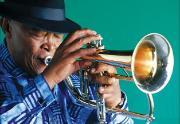
SHALL we dance, he asks the waitress as she steps aside to show him to his table at the Hyatt Hotel in Rosebank, Johannesburg. She smiles with delight that Mr Hugh Ramopolo Masekela himself has asked her to dance. The Hyatt lounge is a favourite meeting place for this man born to music. It's a short drive down Oxford Road from his home in Johannesburg's Killarney.
He's not often here as his touring calendar is intense. At the age of 76 he has back-to-back performances all over the world. He's spent quite a bit of his life on airplanes but his first ever flight remains the most memorable because it was his flight to freedom. Thirty years would pass before he returned home in 1990, following the release of Nelson Mandela in February of that year.
"I left South Africa at the age of 21, in the same year of Sharpeville, which happened in March 1960. After this, the apartheid government started furiously detaining all activists," he explains.
"As a musician you were automatically regarded as an activist or a communist or of breaking the Immorality Act."
To get out of South Africa, Masekela had applied for a passport on a music ticket to study in New York. Already a successful professional musician, and a member of the Jazz Epistles (the first African jazz group to record an LP), he had been offered a scholarship at the Manhattan School of Music, where he was to be tutored by jazz virtuoso Dizzy Gillespie.
"It was very difficult for a black person to get a passport in the 1960s. You had to get all sorts of official letters of invitation from the relevant people overseas, which I managed to do, with plenty of help, as always, from our close family friend, Trevor Huddleston. An Anglican priest, Huddleston was a legendary activist in South Africa who was extremely well connected in political, moneyed, society and academic circles.
Huddleston was a catalyst in Masekela's career. He used his small savings to buy a 14-year-old Masekela his first trumpet, and a few years later influenced Louis "Satchmo" Armstrong himself to send Masekela a second trumpet when he met him at a gathering in the United States.
"When my mother called me to say my passport had arrived months of apprehension turned to excitement combined with a different form of apprehension as I wasn't yet out of South Africa" Maskela recalls.
An associate of Huddleston's funded his plane ticket and he immediately headed for what was then Jan Smuts Airport (now Oliver Tambo) to get on a plane to London. From there he would fly to his new life in New York.
"My heart was in my throat as they closed the door of the plane at Jan Smuts," Masekela recalls. "I thought the cops would burst in any minute and remove me. It was only when we were in the air and beyond South Africa's border that I started to relax and enjoy my first ever flight and the taste of freedom."
Masekela pauses for a moment to order breakfast - muesli, followed by bacon and eggs - and then resumes the narrative: "So there I was sitting on the plane and this glamorous stewardess comes up to me and says: 'Sir, what would you like to drink?'
I nearly jumped out of my skin because I had never ordered a legal drink in my life and everyone on the plane was looking at me, the only black person on the flight.
"In the shebeens where I drank, you see, one person would be assigned as the pourer, and we would then share one glass between a bunch of us and hand the brandy around. A full bottle was called a straight; a half bottle was a half jack, the next size was a nip, followed by a honey and a half nip. I wanted to ask the stewardess for a honey and two beers, but I realised that she would not know what that is.
"Fortunately I remembered a scene from a movie I had seen starring Humphrey Bogart, and I had never forgotten what he said when he ordered a drink in classic Bogart drawl, 'Give me a triple scotch on the rocks, light on the soda'.
As a young man he thrived in the cosmopolitan New York jazz scene alongside other great men and women of music, including Dizzy Gillespie, Louis Armstrong, Miles Davis and Miriam Makeba, who was also a big love of his and they were married for a time.
While marriage hasn't worked out for him (he and his fourth wife divorced last year), his life and career has been a triumph of music. As a trumpeter, flugelhornist, cornetist, composer, and singer he is without doubt one of South Africa's most successful artists and his influence on world music has been nothing short of phenomenal.
Article by: Heather Dugmore
Article source: Weekend Post
